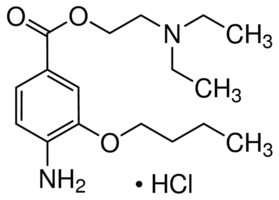To anaesthetise the mucous membrane 2 separate drugs were given topically:
Oxybuprocaine hydrochloride and Lidocaine hydrochloride. The reason to use both of them seem to be beginning of action and its duration (the former starts faster but shorter, the latter starts later but longer acting).
If instead having them in separate bottles they will be mixed in one, would it cause any interactions between them?
oxybuprocaine:


